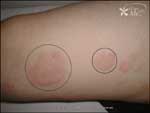 | |
Hives
|
 |

Abnormal |
| |
- This is a reaction in the skin involving small, red swellings called wheals.
- Hives occur when the body's immune system reacts to an outside stimulus, such as an allergen, in an inappropriate manner, releasing IgE antibodies that trigger a "complement cascade" of histamine. The histamine results in the red lesions of Hives that we
see.
|
 |
- Red circular Hives/wheals -- red, raised welts. Sometimes the welts will "melt into each other," giving the appearance of areas with large raised red swelling
- Itching is usually severe, but occasionally absent.
- Swelling of tongue, lips, eyelids,
palms, soles, and genitals in more severe attacks. Breathing
problems may also
occur.
|
 |
- Food, e.g., shellfish, nut, strawberries
- Environmental, e.g., feathers, animal hairs, and cosmetics
- Medications, e.g., penicillin,
aspirin
- Medications -- nonallergic form, e.g., Atropine, Pilocarpine, Morphine
- Insect/bug bites and stings
- Heat
- Cold
- Skin pressure
- Infections such as Hepatitis B
|
 |
- Epinephrine 1:1000 injection for severe reactions (especially if associated breathing problems or more severe reactions such as swollen lips and tongue occur)
- Antihistamines, e.g., Hydroxyzine, Zyrtec
- Oral Prednisone is sometimes helpful.
- Doxepin (an older antidepressant)
helps in chronic cases
|
 |
- Seek immediate medical attention.
This condition can be life threatening if it is not treated
immediately.
|
| | |

